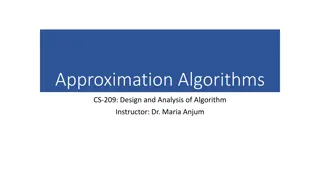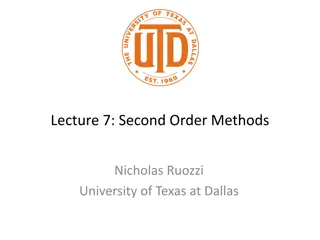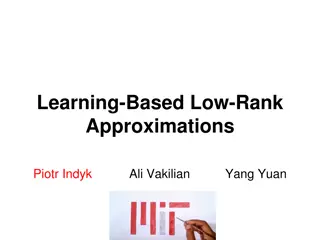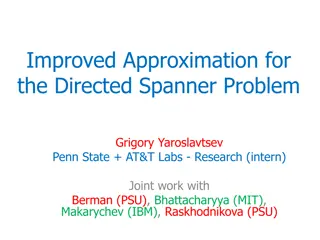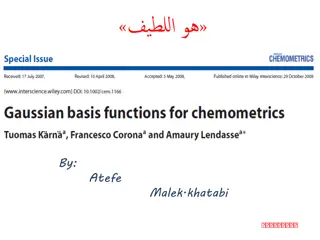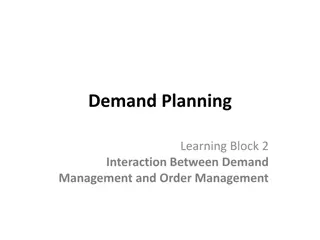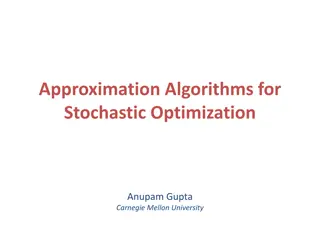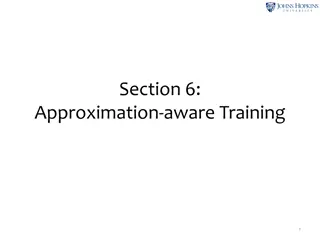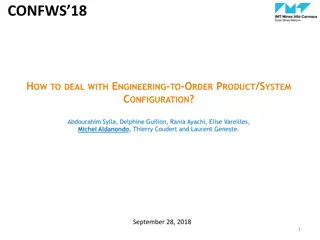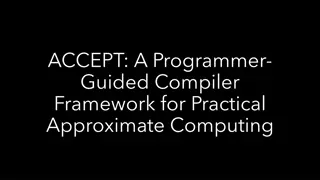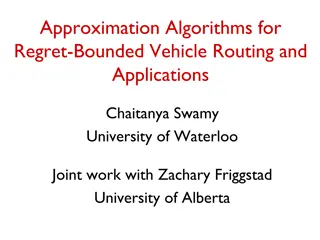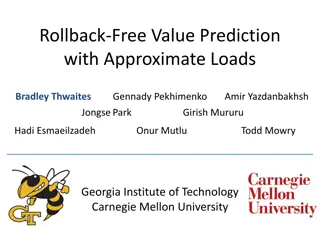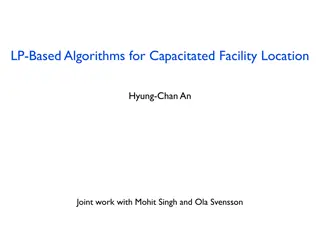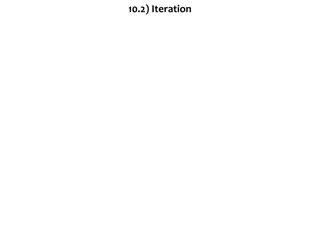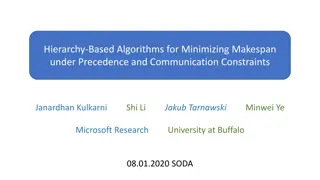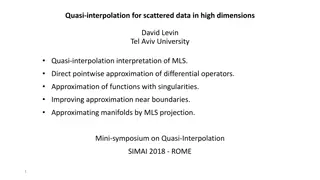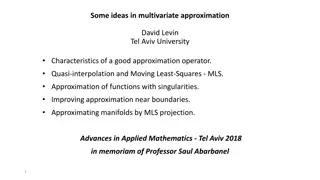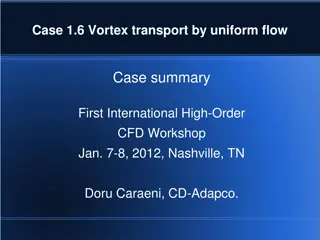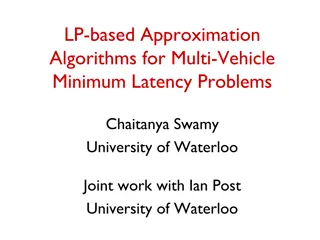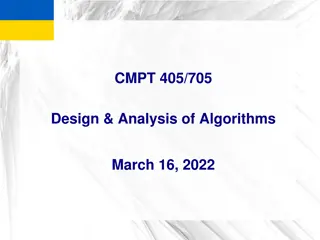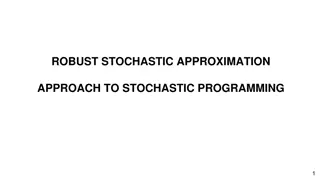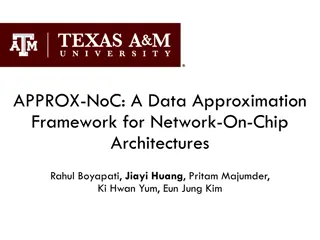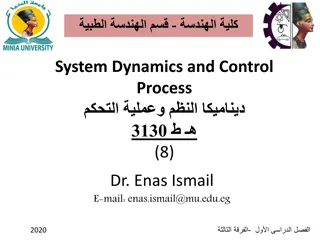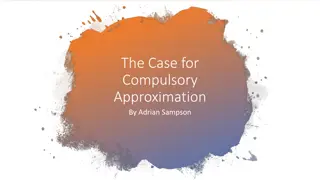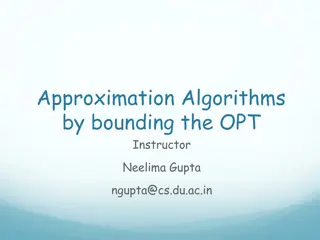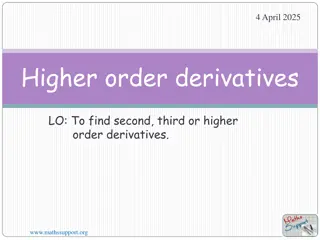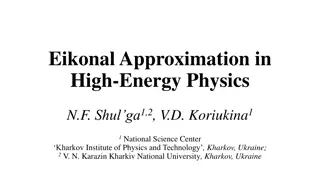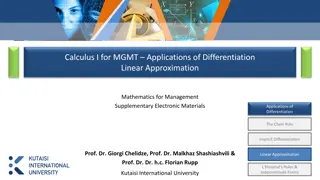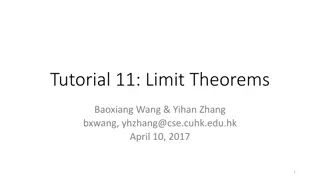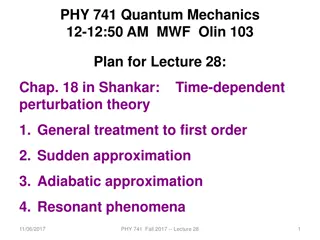Approximation Algorithms: Types, Terminology, and Performance Ratios
Approximation algorithms aim to find near-optimal solutions for optimization problems, with the performance ratio indicating how close the algorithm's solution is to the optimal solution. The terminology used in approximation algorithms includes P (optimization problem), C (approximation algorithm),
4 views • 10 slides
Optimization Methods: Understanding Gradient Descent and Second Order Techniques
This content delves into the concepts of gradient descent and second-order methods in optimization. Gradient descent is a first-order method utilizing the first-order Taylor expansion, while second-order methods consider the first three terms of the multivariate Taylor series. Second-order methods l
1 views • 44 slides
Learning-Based Low-Rank Approximations and Linear Sketches
Exploring learning-based low-rank approximations and linear sketches in matrices, including techniques like dimensionality reduction, regression, and streaming algorithms. Discusses the use of random matrices, sparse matrices, and the concept of low-rank approximation through singular value decompos
0 views • 13 slides
Improved Approximation for the Directed Spanner Problem
Grigory Yaroslavtsev and collaborators present an improved approximation for the Directed Spanner Problem, exploring the concept of k-Spanner in directed graphs. The research delves into finding the sparsest k-spanner, preserving distances and discussing applications, including simulating synchroniz
0 views • 20 slides
Notch Approximation for Low-Cycle Fatigue Analysis in Structural Components
Structural components subjected to multi-axial cyclic loading can be analyzed for low-cycle fatigue using notch approximation. By transforming elastic response into an elastoplastic state, the computation time is reduced, and fatigue evaluation is done based on the Smith-Watson-Topper model. Strain-
0 views • 4 slides
Functional Approximation Using Gaussian Basis Functions for Dimensionality Reduction
This paper proposes a method for dimensionality reduction based on functional approximation using Gaussian basis functions. Nonlinear Gauss weights are utilized to train a least squares support vector machine (LS-SVM) model, with further variable selection using forward-backward methodology. The met
0 views • 23 slides
Demand Planning and Order Management: Enhancing Efficiency
Explore the intricate relationship between demand planning and order management, crucial for optimizing customer order fulfillment cycles. Learn key principles, tools, and techniques to enhance communication and manage demand effectively, along with contemporary approaches and e-commerce fulfillment
2 views • 28 slides
Approximation Algorithms for Stochastic Optimization: An Overview
This piece discusses approximation algorithms for stochastic optimization problems, focusing on modeling uncertainty in inputs, adapting to stochastic predictions, and exploring different optimization themes. It covers topics such as weakening the adversary in online stochastic optimization, two-sta
0 views • 33 slides
Advanced NLP Modeling Techniques: Approximation-aware Training
Push beyond traditional NLP models like logistic regression and PCFG with approximation-aware training. Explore factor graphs, BP algorithm, and fancier models to improve predictions. Learn how to tweak algorithms, tune parameters, and build custom models for machine learning in NLP.
0 views • 49 slides
Engineering-To-Order Product/System Configuration Strategies
Strategies for dealing with engineering-to-order product/system configuration including assemble-to-order, make-to-order, configure-to-order, and engineer-to-order approaches. Highlights different levels of diversity, challenges, and solutions in personalized system configurations.
0 views • 10 slides
ACCEPT: A Programmer-Guided Compiler Framework for Practical Approximate Computing
ACCEPT is an Approximate C Compiler framework that allows programmers to designate which parts of the code can be approximated for energy and performance trade-offs. It automatically determines the best approximation parameters, identifies safe approximation areas, and can utilize FPGA for hardware
1 views • 15 slides
Regret-Bounded Vehicle Routing Approximation Algorithms
Regret-bounded vehicle routing problems aim to minimize client delays by considering client-centric views and bounded client regret measures. This involves measuring waiting times relative to shortest-path distances from the starting depot. Additive and multiplicative regret measures are used to add
0 views • 28 slides
Approximation Algorithms for Regret-Bounded Vehicle Routing
This research explores regret-bounded vehicle routing problems (VRPs) where the focus is on minimizing client delays based on their distances from the starting depot. The study introduces a client-centric view to measure regret and devises algorithms for both additive and multiplicative regret-based
1 views • 23 slides
Enhancing Processor Performance Through Rollback-Free Value Prediction
Mitigating memory and bandwidth walls, this research extends rollback-free value prediction to GPUs, achieving up to 2x improvement in energy and performance while maintaining 10% quality degradation. Utilizing microarchitecturally-triggered approximation to predict missed loads, this work focuses o
0 views • 7 slides
LP-Based Algorithms for Capacitated Facility Location
This research presents LP-Based Algorithms for the Capacitated Facility Location problem, aiming to choose facilities to open and assign clients to these facilities efficiently. It discusses solving the problem using metric costs, client and facility sets, capacities, and opening costs. The research
0 views • 36 slides
Iterative Root Approximation Using Natural Logarithm
The content covers iterative root approximation using natural logarithm in solving equations. It explores finding roots by iterative formulas and demonstrates calculations to reach approximate values. The process involves selecting intervals to show correct values and ensuring continuity for accurat
0 views • 14 slides
Hierarchy-Based Algorithms for Minimizing Makespan under Precedence and Communication Constraints
This research discusses hierarchy-based algorithms for minimizing makespan in scheduling problems with precedence and communication constraints. Various approximation techniques, open questions in scheduling theory, and QPTAS for different settings are explored, including the possibility of beating
0 views • 25 slides
Quasi-Interpolation for Scattered Data in High Dimensions: Methods and Applications
This research explores the use of quasi-interpolation techniques to approximate functions from scattered data points in high dimensions. It discusses the interpretation of Moving Least Squares (MLS) for direct pointwise approximation of differential operators, handling singularities, and improving a
1 views • 9 slides
Advanced Techniques in Multivariate Approximation for Improved Function Approximation
Explore characteristics and properties of good approximation operators, such as quasi-interpolation and Moving Least-Squares (MLS), for approximating functions with singularities and near boundaries. Learn about direct approximation of local functionals and high-order approximation methods for non-s
1 views • 9 slides
Vortex Transport by Uniform Flow - High-Order CFD Workshop Summary
Vortex transport by uniform flow case study presented at the First International High-Order CFD Workshop in 2012. It focuses on assessing the efficiency of high-order methods for LES/DES of turbulent flows and comparing them with state-of-the-art 2nd order FV algorithms. The case involves a very low
0 views • 11 slides
LP-Based Approximation Algorithms for Multi-Vehicle Minimum Latency Problems
The research discusses LP-based approximation algorithms for solving Multi-Vehicle Minimum Latency Problems, focusing on minimizing waiting times for vehicles visiting clients starting from a depot. Various cases, including single- and multi-depot scenarios, are explored, and significant improvement
0 views • 28 slides
Approximation Algorithms in Design & Analysis of Algorithms
Uncover the world of approximation algorithms in the realm of Design & Analysis of Algorithms. Delve into topics like 7/8 approximation for Max-3-SAT, Quick Sort with random pivot, and the 7/8 approximation for Max-3-CNF with in-depth explanations and proofs of the algorithms involved.
0 views • 16 slides
ROBUST STOCHASTIC APPROXIMATION APPROACH TO STOCHASTIC PROGRAMMING
Discussed are stochastic optimization problems, including convex-concave saddle point problems. Solutions like stochastic approximation and sample average approximation are analyzed. Theoretical assumptions and notations are explained, along with classical SA algorithms. Further discussions delve in
0 views • 41 slides
Approximation Algorithms: Tackling NP-Hard Problems
Delve into the realm of approximation algorithms to solve NP-hard optimization problems efficiently and effectively. Explore the concept of NP-hardness, approximation ratios, and strategies for finding near-optimal solutions. Understand the trade-offs between accuracy and complexity in algorithm des
1 views • 10 slides
Approximation Algorithms for NP-complete Problems
Dive into the world of approximation algorithms for NP-complete problems like Min Vertex Cover with a focus on providing good but not optimal solutions. Explore various approximation techniques and algorithms to tackle these challenging computational problems efficiently.
0 views • 36 slides
Theory of Approximation: Interpolation
In the study of approximation theory, interpolation plays a crucial role in representing data points using polynomials and splines. This content discusses the concepts of interpolation polynomials, including Newton's Divided Difference and Lagrange Polynomials, as well as spline interpolation techni
0 views • 16 slides
Greedy Approximation Algorithm for MAX SAT
Study a simple greedy approximation algorithm for MAX SAT problem, where the goal is to maximize the weight of satisfied clauses using Boolean variables and clauses with weights. Discuss approximation algorithms, deterministic algorithms, LP relaxation, and randomized rounding techniques.
1 views • 42 slides
Green: A Framework for Energy-Conscious Programming
Programmers often approximate functions and loops without quantifying the error or benefits, leading to maintenance challenges. The Green framework addresses this by quantifying tradeoffs in performance, energy consumption, and quality of service through a controlled approximation approach. It allow
0 views • 24 slides
Data Approximation Framework for Network-On-Chip Architectures
Data Approximation Framework for Network-On-Chip Architectures presented by Rahul Boyapati, Jiayi Huang, Pritam Majumder, Ki Hwan Yum, Eun Jung Kim explores the concept of approximation in NoCs to achieve higher throughput, mitigate memory bandwidth bottleneck, and increase data similarity for impro
0 views • 31 slides
Approximation Methods for Higher-Order Transfer Functions in Control Systems
Learn about approximation methods for higher-order transfer functions in control systems, including first-order plus time delay (FOPTD) and second-order plus time delay (SOPTD) models. Discover techniques such as Taylor series expansion, pad approximations, and Skogestad's half rule for simplifying
0 views • 14 slides
Exploring Compulsory Approximation in Technology Domains
Delve into the concept of compulsory approximation in various technology domains highlighted by Adrian Sampson. Discover the benefits, challenges, and application of compulsory approximation techniques in machine learning and parallel computing methods like Hogwild. Uncover how existing approximatio
0 views • 19 slides
Understanding Approximation Algorithms by Bounding the Optimum
Dive into the world of approximation algorithms and learn how to find solutions close to the optimum for NP-Complete problems using bounding techniques. Explore factor-2 algorithms, lower bounding the OPT, and potential improvements in approximation guarantees.
0 views • 33 slides
Understanding Higher Order Derivatives in Mathematics
Explore the concept of higher order derivatives in mathematics by delving into finding second, third, or higher order derivatives of functions. Learn how to interpret second order derivatives in the context of velocity and acceleration functions. Discover the notation and efficiency of expressing hi
0 views • 12 slides
Approximation Algorithms in Optimization Problems
Explore the world of approximation algorithms in optimization problems, where we seek the best solutions efficiently but not always optimally. Learn about NP-hardness, approximation ratios, and a clever algorithm for finding an approximation for Vertex Cover.
0 views • 30 slides
High-Energy Physics: Eikonal Approximation and Atom Chains
Explore the eikonal approximation in high-energy physics, focusing on charged particle scattering and atom distribution functions in different media. Learn about the Born approximation and its application in scattering on atom chains. Discover the impact of coherence effects and how potential energy
0 views • 12 slides
Greedy Approximation Algorithm for MAX SAT
Explore a simple greedy approximation algorithm for MAX SAT, a problem in Boolean variables and clauses. Learn about approximation algorithms and deterministic methods for maximization, LP relaxation, and randomized rounding.
0 views • 42 slides
Linear Approximation in Mathematics for Management with Florian Rupp
Explore the role of linear approximation in mathematics for management, understanding the behavior of functions near a point, quality of approximation, and its applications in this comprehensive guide by Prof. Dr. Florian Rupp. Learn about tangent lines, polynomial approximations, and the accuracy o
0 views • 9 slides
Limit Theorems Tutorial: Central Limit Theorem & Normal Approximation
Understand the Central Limit Theorem and Normal Approximation with examples and calculations. Learn how to apply De Moivre-Laplace Approximation to solve binomial problems. Explore the concept of zero mean and unit variance and its implications in probability theory. Dive into a problem related to a
0 views • 27 slides
Understanding Time-Dependent Perturbation Theory in Quantum Mechanics
Delve into time-dependent perturbation theory in quantum mechanics through topics like general treatment to first order, sudden approximation, adiabatic approximation, and resonant phenomena. The lecture explores the treatment of time-dependent perturbations using complete basis sets and perturbatio
0 views • 12 slides
Understanding Spline Interpolation for Polynomial Approximation
Learn about spline interpolation for polynomial approximation, including linear and cubic splines. Understand how to construct cubic splines passing through given points using MATLAB. Discover the advantages of piecewise-polynomial approximation over single polynomial approximation in function appro
0 views • 23 slides
